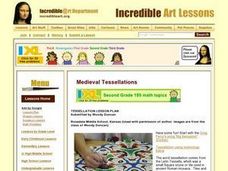Curated OER
Tessellations: Geometric Patterns
Learners create tessellation drawings using repeating geometric shapes.
Curated OER
Tessellation Lesson Plan
Students produce original tessellations, using equilateral triangles where three unique symmetrical faces rotate, use shape, pattern/repetition, and color to create a striking composition, and create "beasties" inspired by bestiaries of...
Curated OER
M. C. Escher - Design - Math Integration
Learners create a tessellations using rotation and translation. They also create a tessellation using reflection.
Curated OER
Tesselations
Seventh graders produce a tessellation of an original design developed using an equilateral triangle, where three unique symmetrical faces rotate throughout their creation.
Curated OER
Terrific Tessellations
Students explore tessellations that are found in nature and everyday objects. They observe the works of M.C. Escher. Students create their own tessellations using pencil and paper.
Curated OER
Architecture
Students study tessellations and the work of M.C. Escher. They discuss the terminology of architecture, the historical significance of architecture in different parts of the world, and create their own piece of architecture out of...
Curated OER
Visual Arts: Matisse and Escher
Third graders are introduced to the art of Henri Matisse and M.C. Escher. They create original works in the styles of Matisse and Escher and consider how their innovations have affected modern art.
Creative Educator
Tessellation Sensation
Geometers investigate patterns and symmetry, and examine the artwork of M.C. Escher on the Internet. They compare his style to the floor and ceiling tiles in the classroom. If you have ImageBlender™ software, you could have your...
Curated OER
Miras, Mirrors, and Kaleidoscopes!
Students use hands-on activities to explore transformations. They view a video segment that demonstrate how M. C. Escher employed geometry and transformations to create so many of his famous drawings.
Curated OER
Batlik- Art of Japan
Eighth graders will examine the use of Japanese ar tforms. The paper lantern is the example drawn from for learners to connect with the culture. The end result is a creative project that should reflect the culture of Japan.









